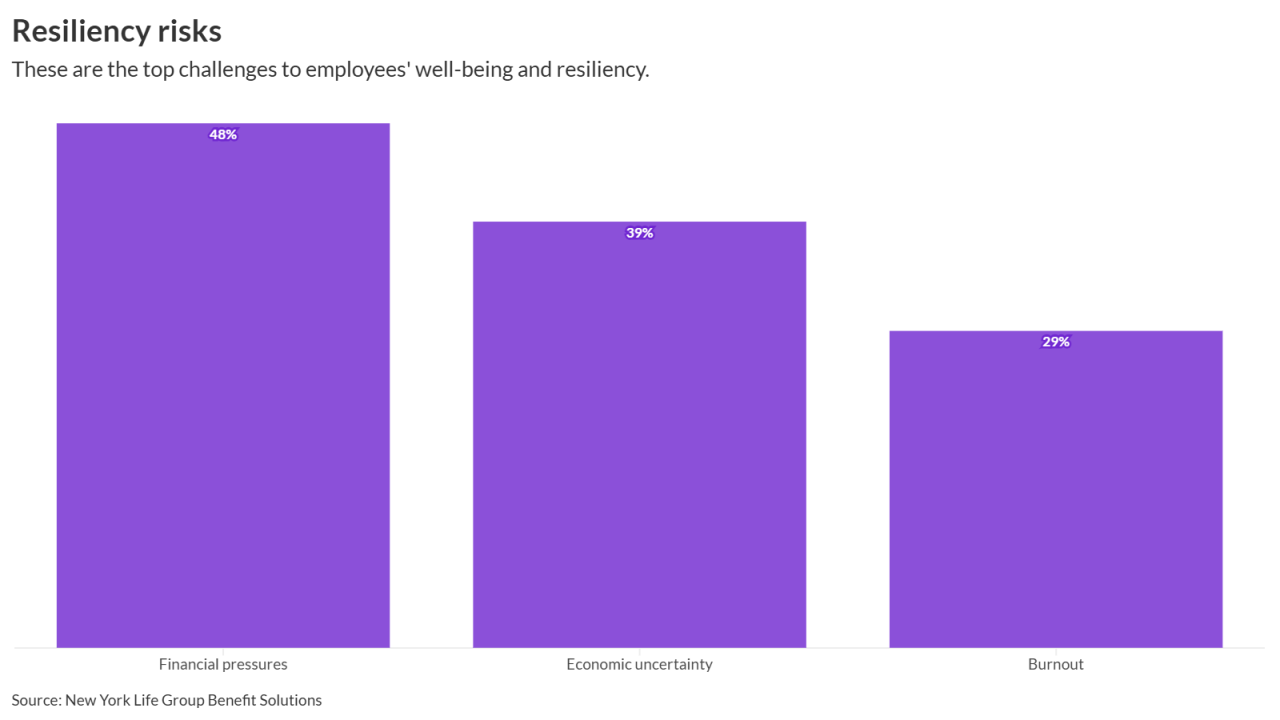Artificial intelligence has officially found a home in the workplace. But as fears of an AI takeover grow, it's on managers to find the most balanced way to use the tech to support workers rather than replace them.
Processing Content
Fifty-six percent of office workers report using artificial intelligence as part of their regular job duties, according to BusinessDIT, a business and digital marketing resource hub. Eighty-one percent said AI has improved their job performance and 89% say it could support them in up to half of their everyday work activities. Managers largely agree. Ninety-three percent plan to encourage their employees to test and use AI tools if the tools will help them perform better at work, according to software company Beautiful.ai. But there are still lessons to learn for both parties.
"AI has forced companies and managers to redefine the way they work," says Lisa Sterling, chief people manager at people analytics platform Perceptyx. "Managers are expected to provide employees with the tools they need to be successful — and that's a big responsibility."
Read more: Using AI to recruit? You're legally responsible for the bot's bias, EEOC says
When it comes to AI in the workplace, implementation can be as simple as voice to text features and computerized responders for online customer support, all the way to hyper-intelligent chatbots like ChatGPT and Google's Bard, which can summarize reports, track meeting notes and even help an employee brainstorm ideas for a task or project. It's up to managers to provide guidance and set boundaries around what the acceptable use of these technologies is.
It's just as important to acknowledge the ways in which it can be perceived as a threat, says Gene Caballero, the co-founder of GreenPal, an online freelancing platform that connects landscapers to clients. As a digital-first employer, he's had to quell his own employees' fears of the future — and he's not alone. Forty-nine percent of workers fear AI will replace their jobs, according to a recent study commissioned by Microsoft. A recent report from software review site Gitnux found that automation is predicted to displace 20 million manufacturing jobs by the end of 2030; and 25% of American jobs are highly susceptible to automation, with 73 million jobs potentially lost in the U.S. over the next five years.
For Caballero, open and transparent communication is key. It's crucial to have honest conversations with teams about AI and its impact, he says, and managers must be available to address employees' concerns, provide accurate information, and help them understand in layman's terms that AI is not meant to replace humans.
Read more: AI is reinventing HR roles
"Let's not forget the unique qualities that humans bring to the table," Caballero says. "We possess creativity, critical thinking skills, emotional intelligence and adaptability. These are attributes that AI simply can't replicate. By highlighting the human element, we can reassure our employees that their skills and expertise are still highly valuable and sought after."
Cynthia Leimbach, lead conversational and CX designer at the University of Phoenix, specializes in chatbots and AI, and has spent her career teaching about technology and how to embrace it to access information around the clock. Her outlook on AI is far from ruled by fear.
"It has been my observation that AI has not disrupted the workforce," she says. "Rather, the workforce has been reacting to AI and coming from a place of fear and uncertainty instead of approaching it as an opportunity for wisdom, growth and amazing possibilities."
Studies indicate she may be right: In Microsoft's survey, 31% of employers cited AI as a means of "increasing employee productivity." Twenty-nine percent said it is "helping employees with necessary but mundane tasks," and 26% said it is "increasing employee wellbeing." Only 16% chose "reducing headcount," as a primary benefit. The World Economic Forum actually predicts that the AI industry could actually help create around 97 million new jobs by 2025. And no doubt, hiring for those future roles is one of those necessary but mundane tasks that can be expedited with AI.
Read more: How would new regulations on advanced AI affect the workplace?
"AI has disrupted hiring in particular by giving people back valuable time to focus on people-centered tasks like relationship building with top candidates," says Lindsey Zuloaga, chief data scientist at HireVue. "Automated scheduling tools to schedule interviews and smart chatbots to answer pre-hire questions are two examples of tasks that humans shouldn't have to spend their precious time on."
But as AI finds a home in more departments across more industries, managers will also need to keep a keen eye on incoming regulations and proposed safeguards around AI, Zuloaga stresses. She encourages managers to speak with vendors and ask challenging questions about compliance standards, fairness metrics and a company's overall approach to AI ethics before investing in new tools. As for investing in new talent, Leimbach recommends adding a layer to screening efforts that will help identify those who have a passion for building bridges within existing areas of expertise and AI.
"We all must use ethics, compassion and best agile practices," says Leimbach. "Managers in tech should already understand that change is inevitable, but that's the funny thing about humans — we often prefer to live in familiar captivity than the uncertainty of freedom."





